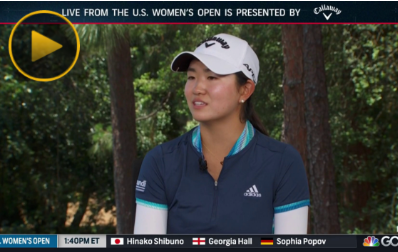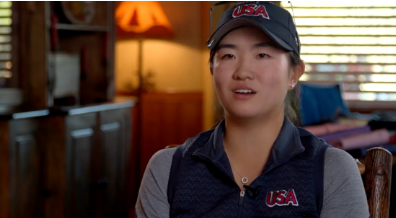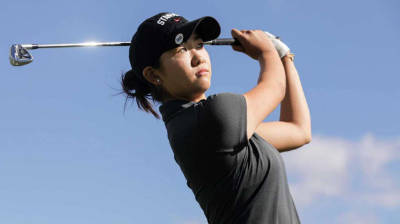We see the success of Rose Zhang: her wins, her clutch putts and her consistency. But what does it actually take to reach this level of achievement? What characteristics about Zhang make her stand out from her competition? What is it about Zhang that makes her so good?
“She does some amazing things,” said George Pinnell, who has been Zhang’s coach going on seven years. “She’ll be three back of the leader and the next thing you know, she finds a way to get something done.”
Zhang began playing golf at age 9 and now, at 18, is the best amateur player in the world. She defeated then reigning U.S. Women’s Amateur champion Gabriela Ruffles on the 36th hole to crown herself the champ last year, and officially became the No. 1-ranked amateur in September after finishing T-11 at the ANA Inspiration. This July, Zhang won the U.S. Girls’ Junior becoming the first player to win the U.S. Women’s Am before the Junior. She celebrated her victory by flying to Evian, France, where she competed in another LPGA major, the Amundi Evian Championship, and made the cut.
But her achievements have not come without routine discipline and a dedicated work ethic, and Zhang has honed in on what her keys are to success.
First, she stays in the present. “I don’t set specific goals, but try to keep myself in a strict practice,” said Zhang.
On a school day, practice begins for Zhang at 2:30 p.m. and ends at 7:30, consisting of 200-300 golf balls on the range and an hour each for chipping and putting. She also sets difficult challenges for herself, which include making 100 4-foot putts in a row, “so when I play in tournaments I’ve already been in a competitive game mode,” Zhang explained.
During the extended range session, Zhang is intensely focused on the second key to her success – her fundamentals.
“Tempo is biggest thing for her. She never gets away from that,” said Pinnell. “And we spend a lot of time on fundamentals: swing plane, club path and positions at the top, which is very important to get club back on plane. We use TrackMan a lot.”
This impeccable self-awareness of the basics helps Zhang both technically and mentally on the course. “I’m pretty in tune in knowing what my body is doing,” she said. “Understanding what tempo I have really helps me calm down on the golf course. Sometimes I tend to quick it up and I definitely feel it. Then I readjust what I need to do.”
A perfect Zhang story, but not often told, occurred at the 2020 Ping Invitational. She lost her lead after a second-round 75 on the challenging Karsten Creek Golf Club in Stillwater, Oklahoma. Zhang headed to the range afterwards, took slow practice swings to sync up her tempo and reviewed her fundamentals. “Within 10 minutes, I had it,” Zhang told her coach after the tournament. She did not hit one shot on the range. Through her slowed-down swings, Zhang realized that she was taking the club back too inside which was causing her to miss shots. “She put her club in her bag and said, ‘OK, Dad, lets go to dinner and get ready for tomorrow,’” Pinnell recalled.
That kind of self-awareness is only possible for someone who constantly works within themselves to achieve peak performance. Her swings may look effortless and her rhythm unmatchable, but effortlessness is only achieved in daily, boring work – 300 range balls, 100 straight 4-footers – and then taking that work to the course.
The day-to-day grind caught up with Zhang around the beginning of the year, when she battled tendinitis in her arm and wrist. “That time was tough mentally and physically,” said Zhang, who could not practice for several weeks. “It was tough to sit down and take a break to rest my wrist and arm. It changed my daily schedule that I was so used to.”
Although frustrating at times, the break was a turning point in Zhang’s career. “I learned a lot more about the real world,” she said. “I was always very into my golf game and didn’t really have time to talk to other people. I learned more about how complicated the world can be.”
Zhang also learned about external voices – those that can be detrimental, if you listen to the wrong ones. “When I didn’t play golf I heard a lot more voices than when I was practicing,” she said. “Being able to tune out the voices I don’t want to listen to and finding my inner-circle was very important.”
“Rose is very open to people and very accepting of people,” said Pinnell, “and she loves to help as many people as she can. But she has realized that she needs to limit her circle and try to shut out any external stuff that may be negative.”
Zhang’s desire to focus on the process and not the results; her ability to zone in on her fundamentals, to be in total sync with her game; the caliber and quality of people with whom she surrounds herself, all boils down to one person – Zhang’s father, Henry.
“My dad is one of the biggest influences in my life and in my character,” said Zhang. “He has high expectations for me and he sacrificed a lot of time and effort for me. He helps me stay driven.”
She also credits her father for developing her into a tough competitor. “He’s always been the one to push me further and that really helps me get into the grit mindset, which takes over into my golf game,” said Rose.
Zhang’s father was on the bag during her low-am run at the 2020 ANA and her U.S. Women’s Amateur win. He’ll return for her title defense in the latter, which begins Monday at Westchester Country Club in Rye, New York.
“Her father has been with her every step of the way and has been very instrumental for Rose on her mental outlook on the game and on life,” said Pinnell. “He has helped her get to a place where she can focus on what she needs to do. If it wasn’t for Henry, Rose wouldn’t be the player she is today.”
























